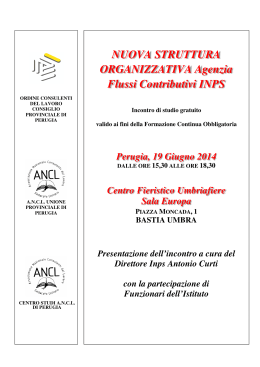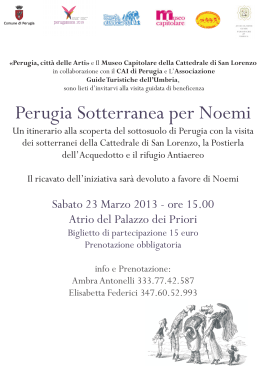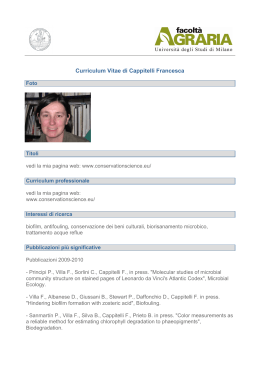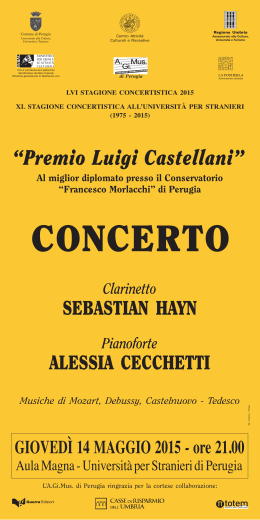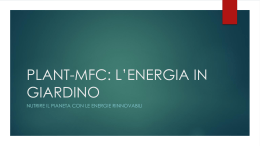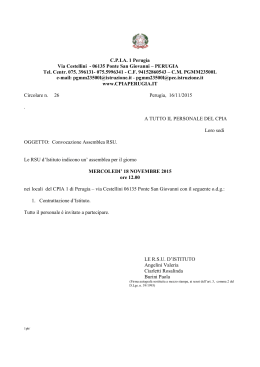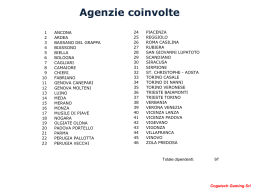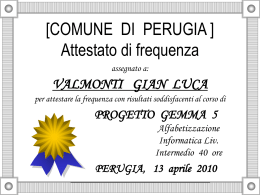SECOND ANNOUNCEMENT The focus of the Conference will be on the following themes: 1. Metabolic complexity of agricultural and natural environments 2. The complexity of food ecosystems: physiology of single strains in pure culture vs. complex consortia 3. Genes and functions in complex microbial communities 4. New tools and strategies to unravel the complexity of microbial diversity 5. Metaorganisms: functional Interdependency of microbial associations with plants, animals and humans 6. Bringing the microbial complexity in the industrial environment SIMTREA Italian Society of Agro-Food and Environmental Microbiology Società Italiana di Microbiologia Agraria, Alimentare e Ambientale is organizing the: 3rd International Conference on Microbial Diversity: THE CHALLENGE OF COMPLEXITY SCIENTIFIC COMMETTEE GIANLUIGI CARDINALI University of Perugia (I) SERGIO CASELLA University of Padua (I) PIERSANDRO COCCONCELLI UCSC Piacenza (I) LUCA COCOLIN University of Turin (I) DANIELE DAFFONCHIO University of Milan (I) BERNARD DUJON Institut Pasteur (F) MARCO GOBBETTI University of Bari (I) PETER N. GOLYSHIN Bangor University (UK) NIKOLAS KALOGERAKIS Technical University of Crete (GR) CLETUS P. KURTZMAN USDA-ARS (USA) SYLVIE LORTAL INRA-Rennes (F) ERASMO NEVIANI University of Parma (I) BENOÎT FOLIGNÉ Institut Pasteur Lille (F) VINCENT ROBERT CBS - Utrecht (NL) IAN DIRK VAN ELSAS University of Groningen (NL) RUDI VOGEL Technische Universität (DK) 2015 with the patronage of: Sala dei Notari Palazzo dei Priori Piazza IV Novembre PERUGIA ORGANIZING COMMETTEE GIANLUIGI CARDINALI University of Perugia (I) (Chair) PIETRO BUZZINI University of Perugia (I) DEBORA CASAGRANDE PIERANTONI University of Perugia (I) LUCA COCOLIN University of Turin (I) CLAUDIA COLABELLA University of Perugia (I) LAURA CORTE University of Perugia (I) SERGIO DE VINCENZI University of Perugia (I) MARCO GOBBETTI University of Bari (I) with the patronage of: ERASMO NEVIANI University of Parma (I) EMANUELE PITARI University of Perugia (I) LUCA ROSCINI University of Perugia (I) MATTEO TIECCO University of Perugia (I) www.md2015.org abstract submission: May 22 early bird registration: July 3 CONTACTS Meeting e-mail: [email protected] Tuesday/October 27 Afternoon GIANLUIGI CARDINALI [email protected] Wednesday/October 28 LAURA CORTE [email protected] Thursday/October 29 All day Morning Tuesday/October 27 14:00 14:15 15:00 15:30 15:30 16:00 17:20 14:15 15:00 15:30 17:20 16:00 17:20 18:30 Welcome and registration Keynote lecture: “Taxonomic concepts and practice with complex microbial communities” CLETUS P. KURTZMAN USDA-ARS (USA) Coffee Break SESSION I: Metabolic complexity of agricultural and natural environments Plenary lecture: “The soil-plant-bacterial-fungal network*” IAN DIRK VAN ELSAS University of Groningen (NL) Selected lectures (4) Poster and Special session I (parallel) / Special Session I: results of selected National and EU projects Wednesday/October 28 8:30 8:30 9:00 10:20 10:40 11:30 11:30 12:00 13:20 14:30 14:30 15:00 16:20 16:40 17:20 10:20 9:00 10:20 10:40 11:25 13:20 12:00 13:20 14:30 16:20 15:00 16:20 16:40 17:20 18:30 SESSION II: The complexity of food ecosystems: physiology of single strains in pure culture vs. complex consortia Plenary lecture: “Spatial distribution and microenvironnement of LAB colonies immobilised in cheeses” SYLVIE LORTAL INRA - Rennes (F) Selected lectures (4) Coffee Break Keynote lecture: “Microbial networks and metabolic fluxes in food fermentations” RUDI VOGEL Technische Universität München (D) SESSION III: Genes and functions in complex microbial communities Plenary lecture: “Metagenomics of pollutant and oil biodegradation” PETER N. GOLYSHIN Bangor University ( UK) Selected lectures (4) Lunch SESSION IV: New tools and strategies to unravel the complexity of microbial diversity Plenary lecture: “Bioinformatic tools for the interpretation of complex biodiversity data” VINCENT ROBERT CBS - Utrecht (NL) Selected lectures (4) Coffee Break Presentation award winning posters Poster and Special session II (parallel) / Special Session II: Young Researchers presentations Thursday/October 29 8:30 8:30 9:00 10:20 10:40 11:30 11:30 12:00 13:20 10:20 9:00 10:20 10:40 11:25 13:20 12:00 13:20 13:30 SESSION V: Metaorganisms: functional Interdependency of microbial associations with plants, animals and humans Plenary lecture: “Human microbiota and health” BENOÎT FOLIGNÉ Institute Pasteur - Lille (F) Selected lectures (4) Coffee Break Keynote lecture: “Genetic bases of Microbial Diversity” BERNARD DUJON Institute Pasteur (F) SESSION VI: Bringing the microbial complexity in the industrial environment Plenary lecture: “Integrating microbiology and engineering for bioremediation” NIKOLAS KALOGERAKIS Technical University of Crete (GR) Selected lectures (4) Farewell – end of the Conference Conference Rationale and General Purpose After the success of the 2nd International Conference on Microbial Diversity: 2013- Microbial Interactions in Complex Ecosystems, SIMTREA is glad to launch the third edition of the conference titled: “The challenge of Complexity”. The meeting aims to gather scientists in the fields of agricultural, environmental and food microbiology in order to promote discussion and exchange of information and experiences regarding the complexity intrinsic in microbial biodiversity. Biology has long been defined the science of complexity for the wealth of relationships among organisms and between the biotic and abiotic components of the environment. In this frame, the increasing awareness of the complexity involved in Microbial Diversity is fueled by unprecedented microbiological studies, innovative technologies in molecular biology and increasing data interpretation efficiency with bioinformatics tools. This perspective poses exciting challenges in terms of methods and substance, which constitute the two scientific standpoints of the MD2015 Symposium. -The Methodological Challenge Microbiologists have used the pure culture approach since C.E. Hansen first introduced the technique more than 130 years ago. Now meta-genomics, meta-metabolomics and meta-proteomics allow for direct studies of communities alpha and beta diversity. These high-throughput techniques produce such a wealth of data per time that current analytical pipelines are often unable to keep thepace, calling for new interpretation approaches. -The Substance Challenge Microbial diversity is present and has an effective action in almost all types of environment, including human body, plant and animals, food, natural and agricultural environments, poses the challenge of a detailed description of the microbiomes and of their evolution over the time. The awareness of rapid microbial circulation poses a further challenge to elucidate this aspect, by comparing microbial diversity among different environments.
Scaricare
